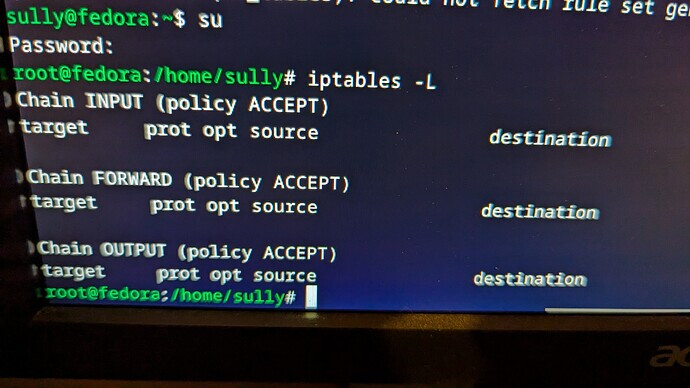It's the same machine, for one of the commands I had to enter root and I just forgot to exit it.
This is what I get when running that command in powershell.
PS C:\Users\gino8> Test-NetConnection 192.168.50.77 -Port 53
WARNING: TCP connect to (192.168.50.77 : 53) failed
ComputerName : 192.168.50.77
RemoteAddress : 192.168.50.77
RemotePort : 53
InterfaceAlias : Ethernet
SourceAddress : 192.168.50.14
PingSucceeded : True
PingReplyDetails (RTT) : 0 ms
TcpTestSucceeded : False
Okay that's the reason why you don't see any devices in Pihole. Port 53 is blocked/not reachable, by other devices than pihole itself. Best guess would be that your pihole config has a wrong setting in listeningmode or something else in fedora blocks the port.
[dns]
upstreams = ["8.8.8.8"]
interface=""
listeningmode="ALL"
port= 53
revServers=[]
[dns.reply.host]
force4 = false
IPv4 =""
to see which interfaces are used by pihole:
sudo ss -nltup | grep 'Netid\|pihole-FTL'
If everything is set correct, my last guess would be that your router asus rx-ax1800 is blocking the connection. But I don't know if its possible in the router firmware / firewall /security settings...
1 Like
These are the results.
sully@fedora:~$ sudo ss -nltup | grep 'Netid\|pihole-FTL'
Netid State Recv-Q Send-Q Local Address:Port Peer Address:PortProcess
udp UNCONN 0 0 0.0.0.0:53 0.0.0.0:* users:(("pihole-FTL",pid=1171,fd=4))
udp UNCONN 0 0 [::]:53 [::]:* users:(("pihole-FTL",pid=1171,fd=6))
tcp LISTEN 0 5 127.0.0.1:4711 0.0.0.0:* users:(("pihole-FTL",pid=1171,fd=10))
tcp LISTEN 0 32 0.0.0.0:53 0.0.0.0:* users:(("pihole-FTL",pid=1171,fd=5))
tcp LISTEN 0 5 [::1]:4711 [::]:* users:(("pihole-FTL",pid=1171,fd=15))
tcp LISTEN 0 32 [::]:53 [::]:* users:(("pihole-FTL",pid=1171,fd=7))
iptables output was in a screenshot nested answer above@gino8807 could you please try to dump DNS traffic on your fedora pc via
sudo tcpdump -ni enp1s0 -e -A src host 192.168.50.14 and port 53
The interface enp1s0 should be set to your interface bound to 192.168.50.77. Normally wlan0/eth0. You can get your correct interface name:
ip a|grep -B2 192.168.50.77
> 3: **enp1s0**: <BROADCAST,MULTICAST,UP,LOWER_UP> mtu 1500 qdisc fq_codel state UP group default qlen 1000
> link/ether XX:XX:XX:XX:XX:XX brd ff:ff:ff:ff:ff:ff
> inet 192.168.50.77/24 metric 100 brd 192.168.50.255 scope global dynamic enp1s0
then on your windows pc with the IP 192.168.50.14 do an DNS lookup
nslookup google.com 192.168.50.77
you should see an tcpdump output like that:
d...5.$~.o............google.com.....
06:47:11.070773 XX:XX:XX:XX:XX:XX > XX:XX:XX:XX:XX:XX, ethertype IPv4 (0x0800), length 70: 192.168.50.14.53988 > 192.168.50.77.53: 24998+ AAAA? google.com. (28)
E..8.(..@...
if nothing happens, then your internal WLAN/LAN blocks the DNS traffic. My best guess would be a firewall setting in your asus rx-ax1800s
1 Like
Above would indicate that DNS requests from your Windows machine never make it to your Pi-hole.
Let's see how that machine would handle a DNS request to a public filtering resolver.
nslookup flurry.com 116.203.32.217
What does below one output?
sudo grep -v '^ *#\|^$' -R /etc/dnsmasq.*
Maybe there is a rogue dnsmasq directive messing things up.
EDIT: As it seems to answer for queries coming from localhost :
It times out.
PS C:\WINDOWS\system32> nslookup google.com 192.168.50.77
DNS request timed out.
timeout was 2 seconds.
Server: UnKnown
Address: 192.168.50.77
DNS request timed out.
timeout was 2 seconds.
DNS request timed out.
timeout was 2 seconds.
DNS request timed out.
timeout was 2 seconds.
DNS request timed out.
timeout was 2 seconds.
*** Request to UnKnown timed-out
PS C:\WINDOWS\system32> nslookup flurry.com 116.203.32.217
Server: dismail.de
Address: 116.203.32.217
Name: flurry.com
Address: 0.0.0.0
sully@fedora:~$ sudo grep -v '^ *#\|^$' -R /etc/dnsmasq.*
[sudo] password for sully:
/etc/dnsmasq.conf:conf-dir=/etc/dnsmasq.d
/etc/dnsmasq.conf.old:conf-dir=/etc/dnsmasq.d
/etc/dnsmasq.d/06-rfc6761.conf:server=/test/
/etc/dnsmasq.d/06-rfc6761.conf:server=/localhost/
/etc/dnsmasq.d/06-rfc6761.conf:server=/invalid/
/etc/dnsmasq.d/06-rfc6761.conf:server=/bind/
/etc/dnsmasq.d/06-rfc6761.conf:server=/onion/
/etc/dnsmasq.d/01-pihole.conf:addn-hosts=/etc/pihole/local.list
/etc/dnsmasq.d/01-pihole.conf:addn-hosts=/etc/pihole/custom.list
/etc/dnsmasq.d/01-pihole.conf:localise-queries
/etc/dnsmasq.d/01-pihole.conf:no-resolv
/etc/dnsmasq.d/01-pihole.conf:log-queries
/etc/dnsmasq.d/01-pihole.conf:log-facility=/var/log/pihole/pihole.log
/etc/dnsmasq.d/01-pihole.conf:log-async
/etc/dnsmasq.d/01-pihole.conf:cache-size=10000
/etc/dnsmasq.d/01-pihole.conf:server=8.8.8.8
/etc/dnsmasq.d/01-pihole.conf:server=8.8.4.4
/etc/dnsmasq.d/01-pihole.conf:domain-needed
/etc/dnsmasq.d/01-pihole.conf:expand-hosts
/etc/dnsmasq.d/01-pihole.conf:bogus-priv
/etc/dnsmasq.d/01-pihole.conf:except-interface=nonexisting
Apparently no rogue directives.
So from below, lookup on the local host to the private address resolve:
And not from a Windows client addressing that private IP:
But a lookup from that Windows PC addressing a public IP does resolve:
Could this be DNS rebind protection?
countermeasure to an attack on your network . So in many cases, it's actu…
Below a screenshot for Asus "DNS rebind protection":
https://www.asus.com/support/faq/1039292/
Sorry for the delay, I checked DNS rebind and it's already off.
I still suspect the router for interfering.
Do you have another PC (Windows, MacOS or Linux) on which you can run below?
When running it on my phone in the android terminal, I get the following.
~$ nslookup -class=chaos -type=txt version.bind 192.168.50.77
;; connection timed out; no servers could be reached
I did notice though on my Windows system when running ipconfig -all, the other DNS is the gateway despite configuring my router to only recognize the pihole as the DNS, should that be the case?
DNS Servers . . . . . . . . . . . : 192.168.50.77
192.168.50.1
Can validate with below:
sudo pihole-FTL dhcp-discover
gino8807:
When running it on my phone in the android terminal, I get the following.
~$ nslookup -class=chaos -type=txt version.bind 192.168.50.77
;; connection timed out; no servers could be reached
Still suspect the router.
Does that Android shell have the nc command available?
nc -vz 192.168.50.77 53
nc -vz 192.168.50.77 22
nc -vz 192.168.50.77 80
Or maybe you have another Linux host to run above?
Set that to no, all devices still not using pihole.
Ran that command on the server running pihole and it just timed out.
Edit, also turning that off subsequently disabled the internet as well so it seems something is blocking proper communication to the server.
They need to renew their DHCP lease first.
ipconfig /renew
Server?
I did renew the ip on my windows machine, no change unfortunately.
I did mention in the post I'm running it on an old dell running fedora, never said I was using a raspberry pi.
